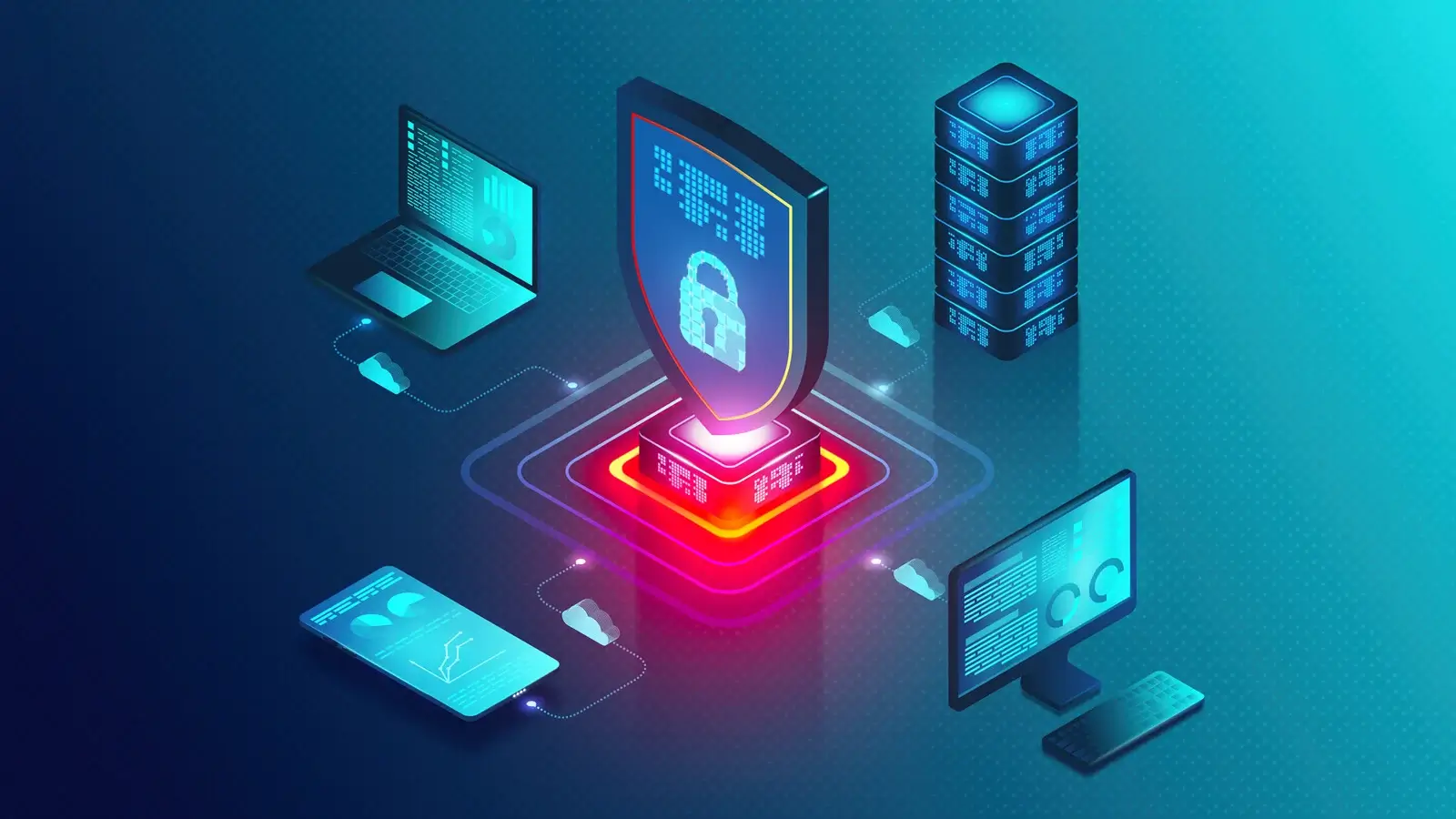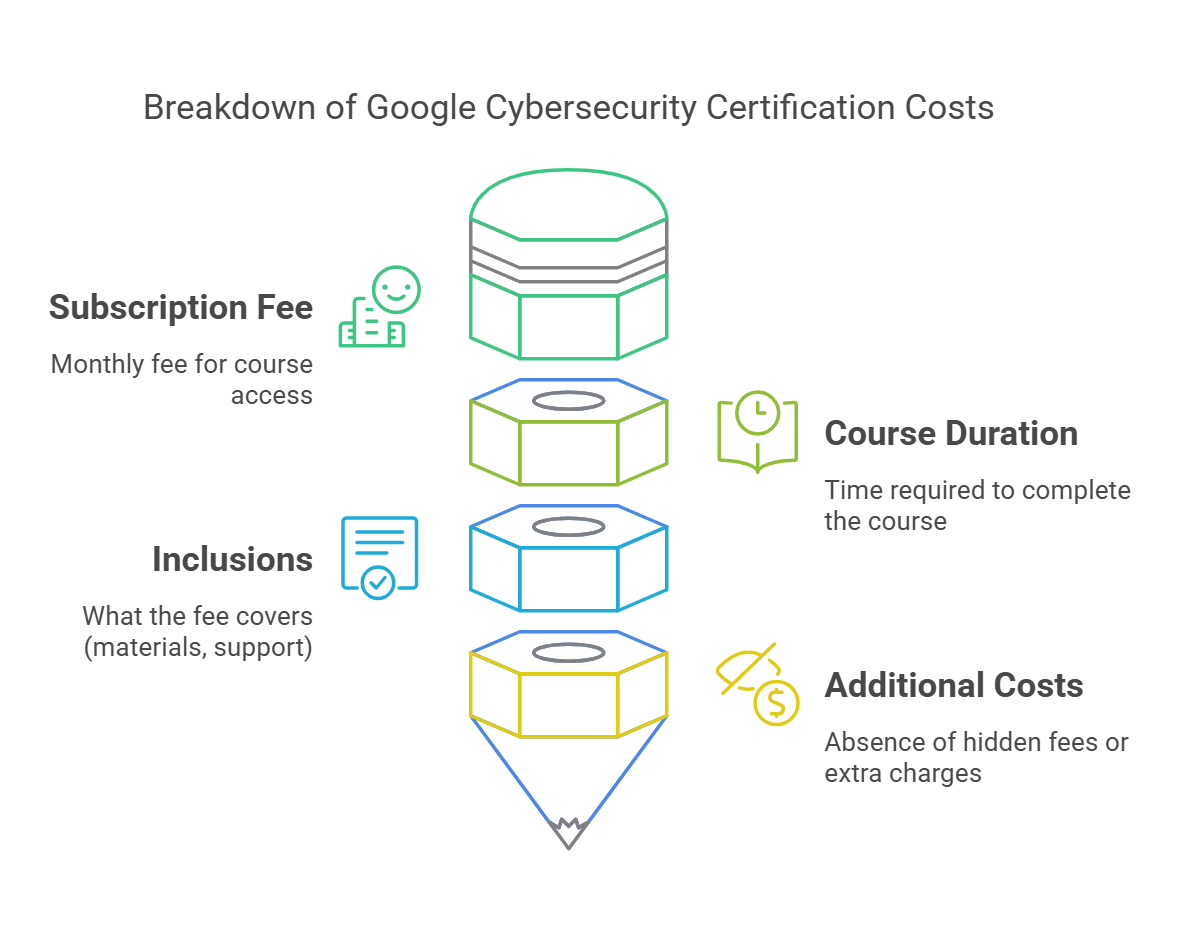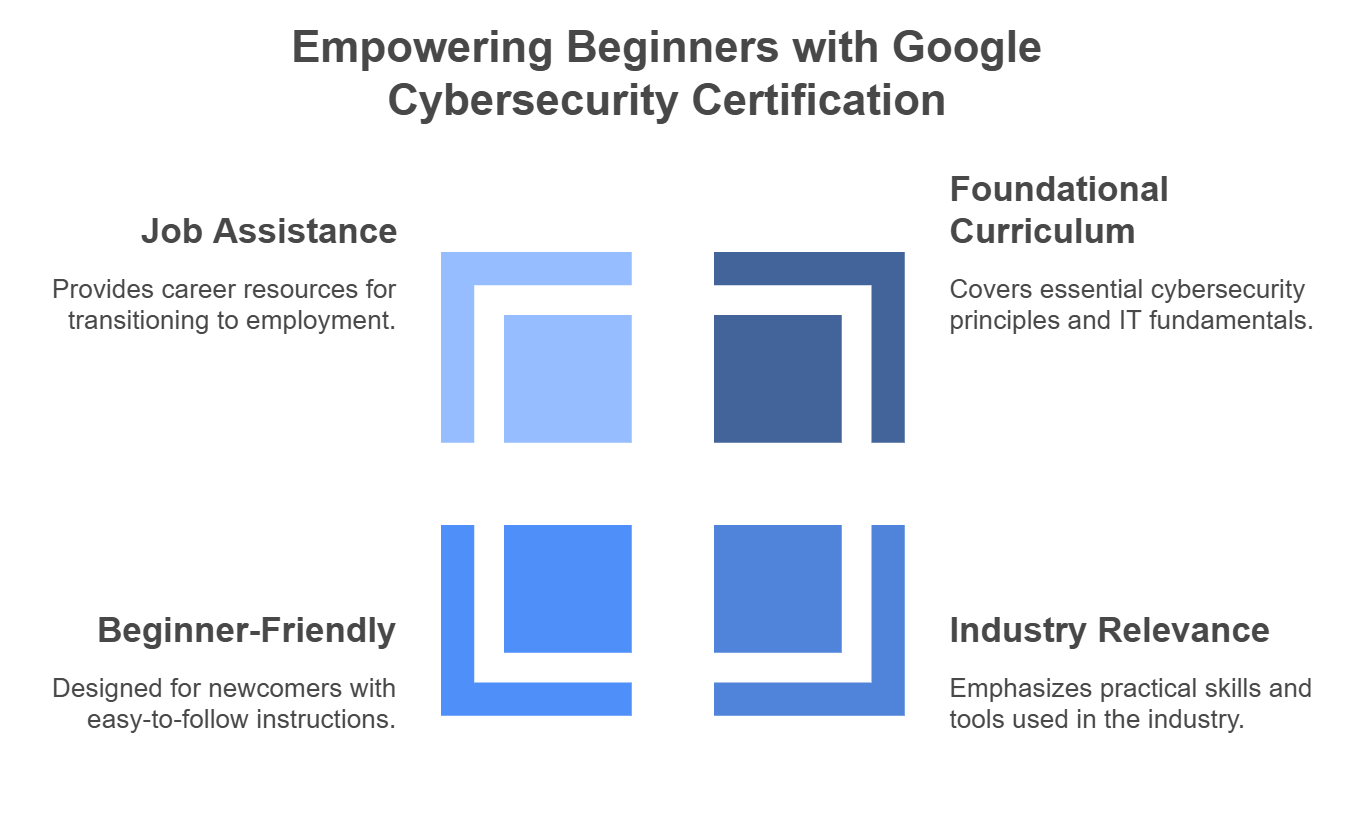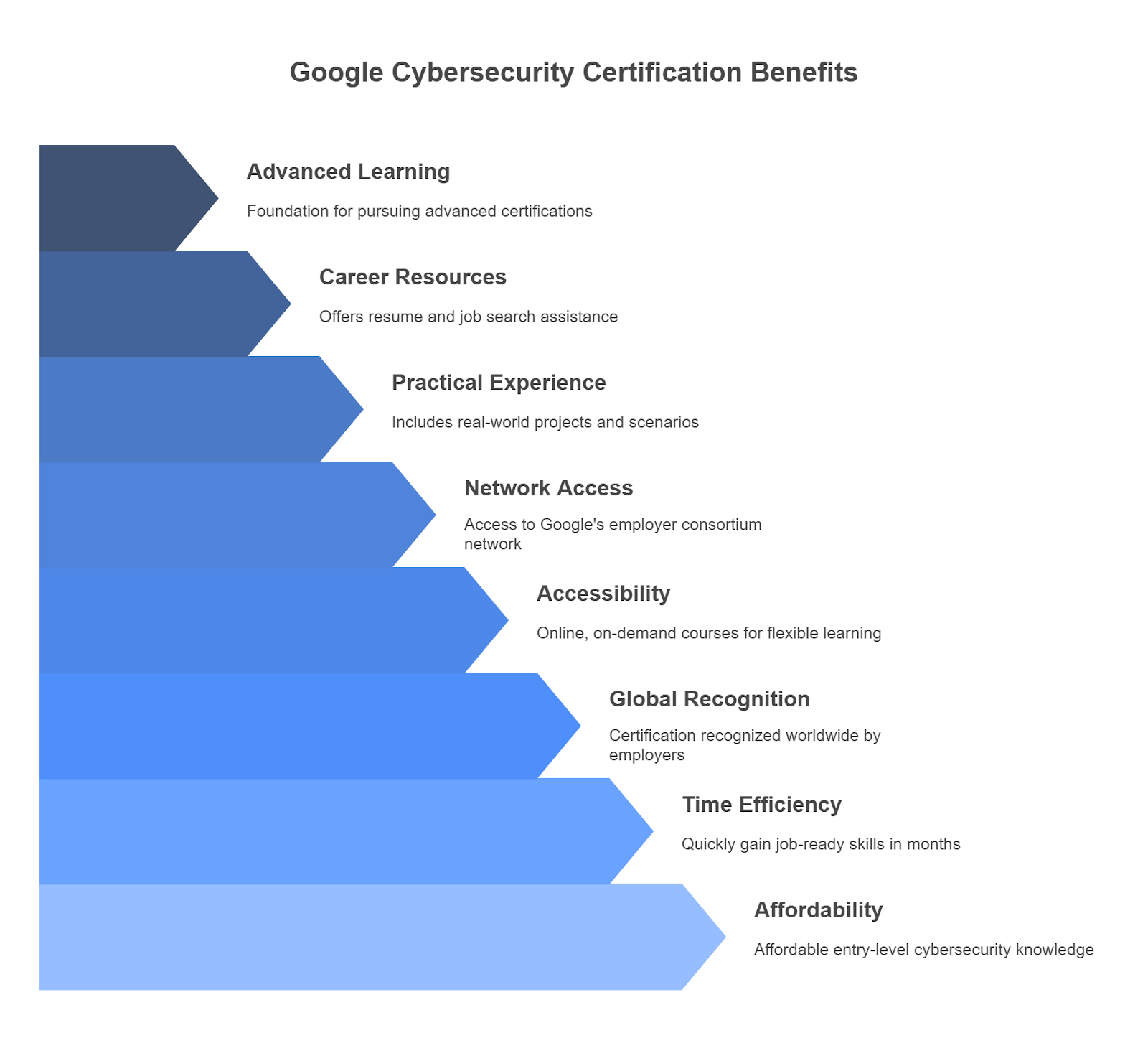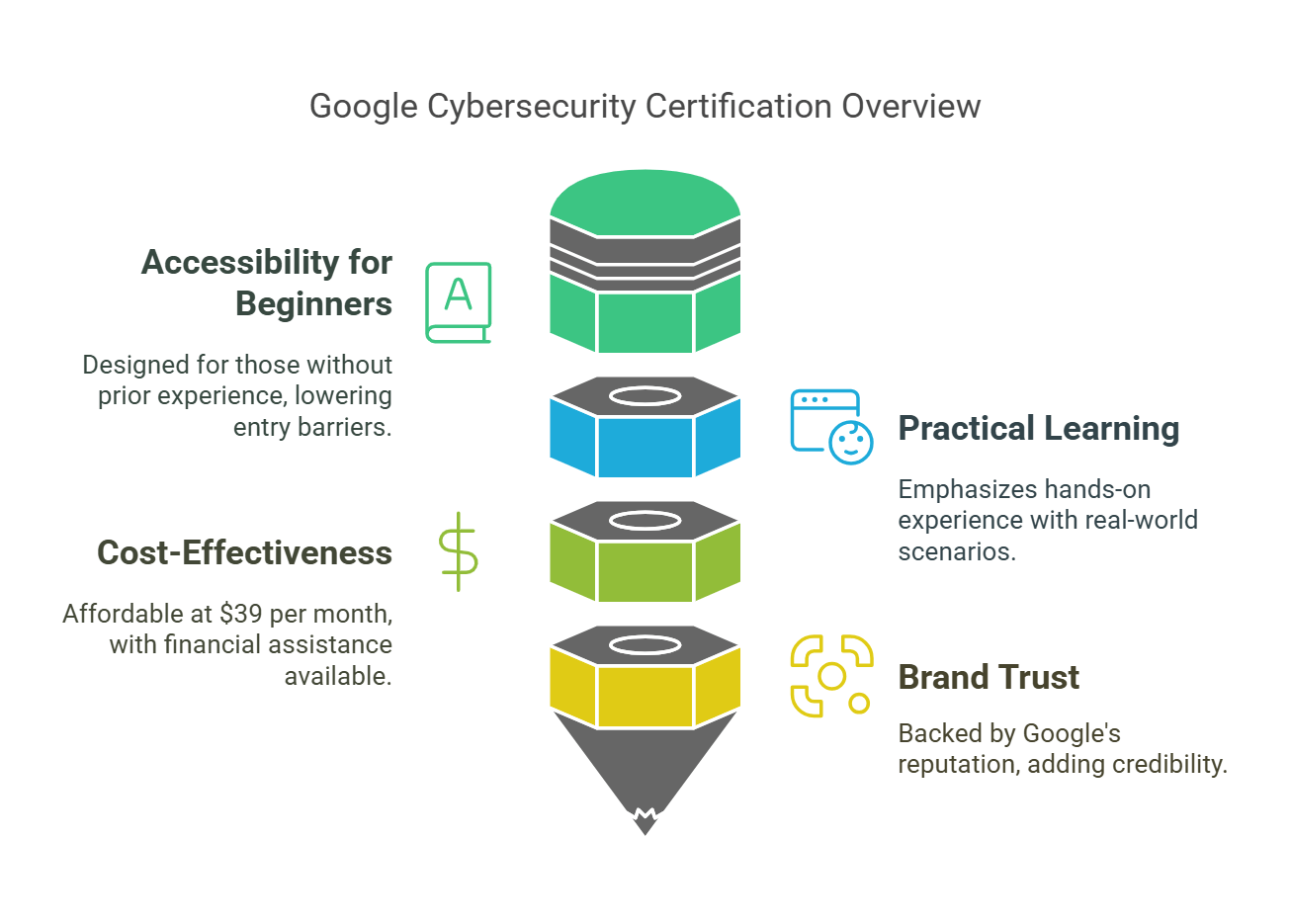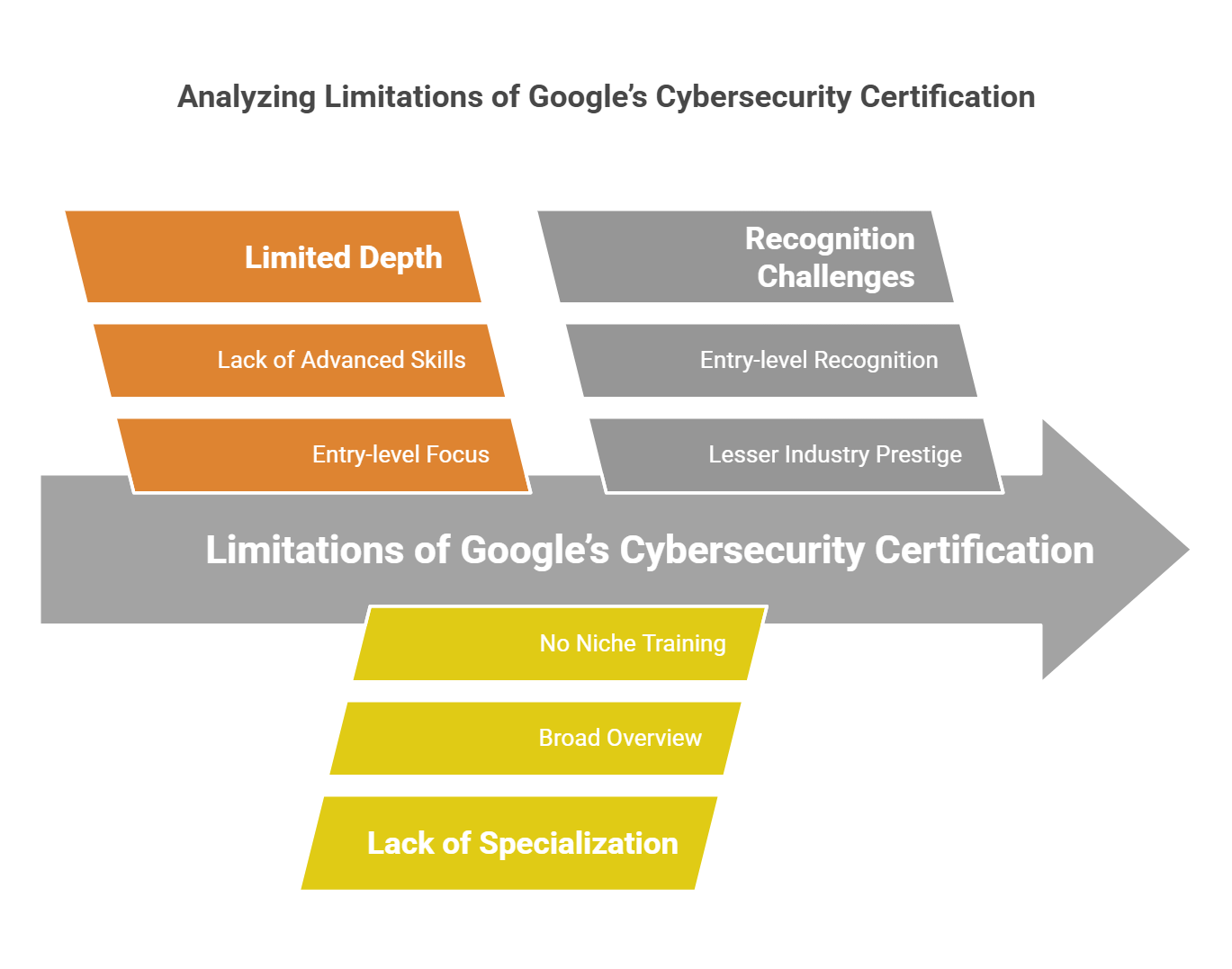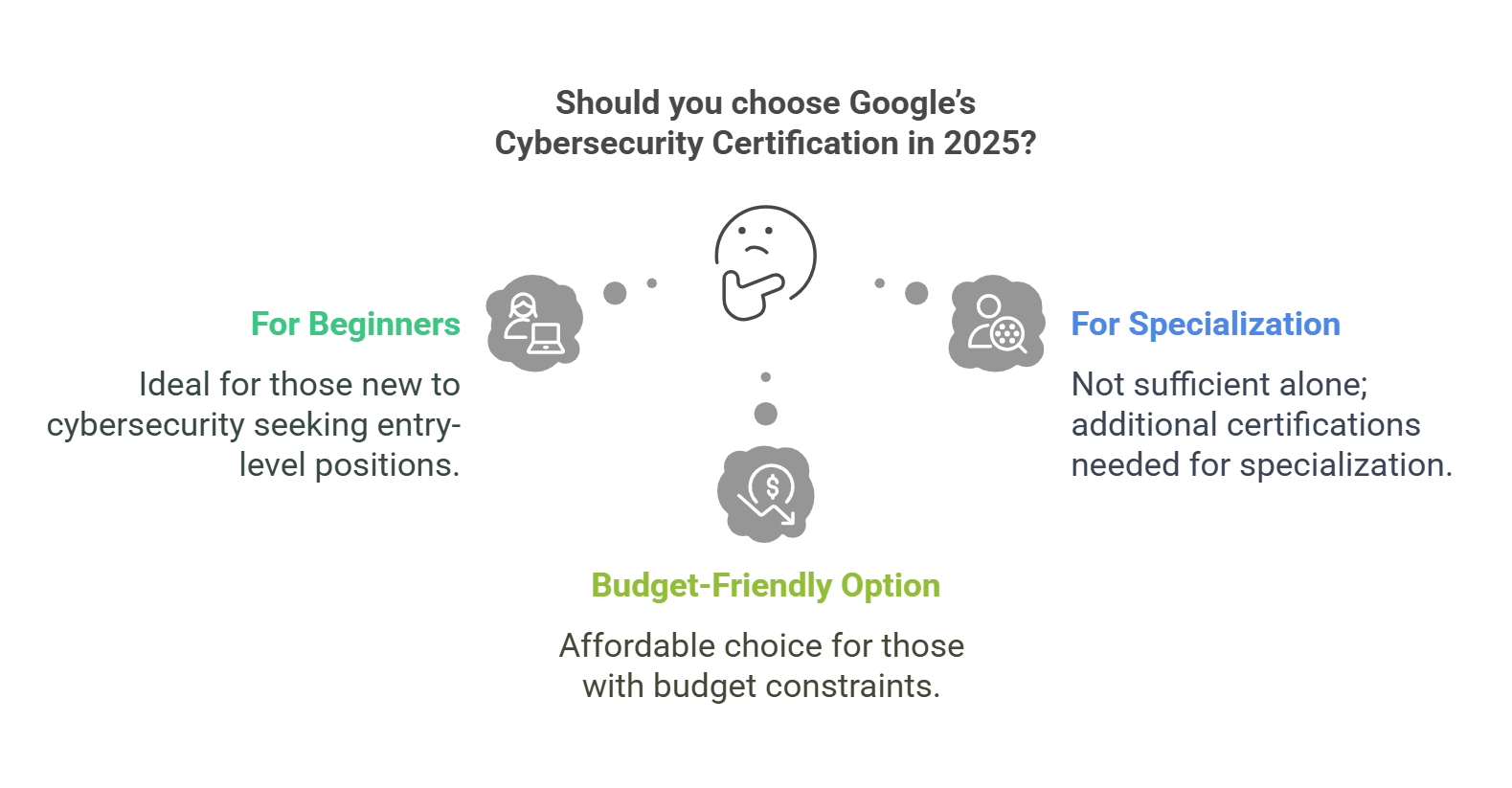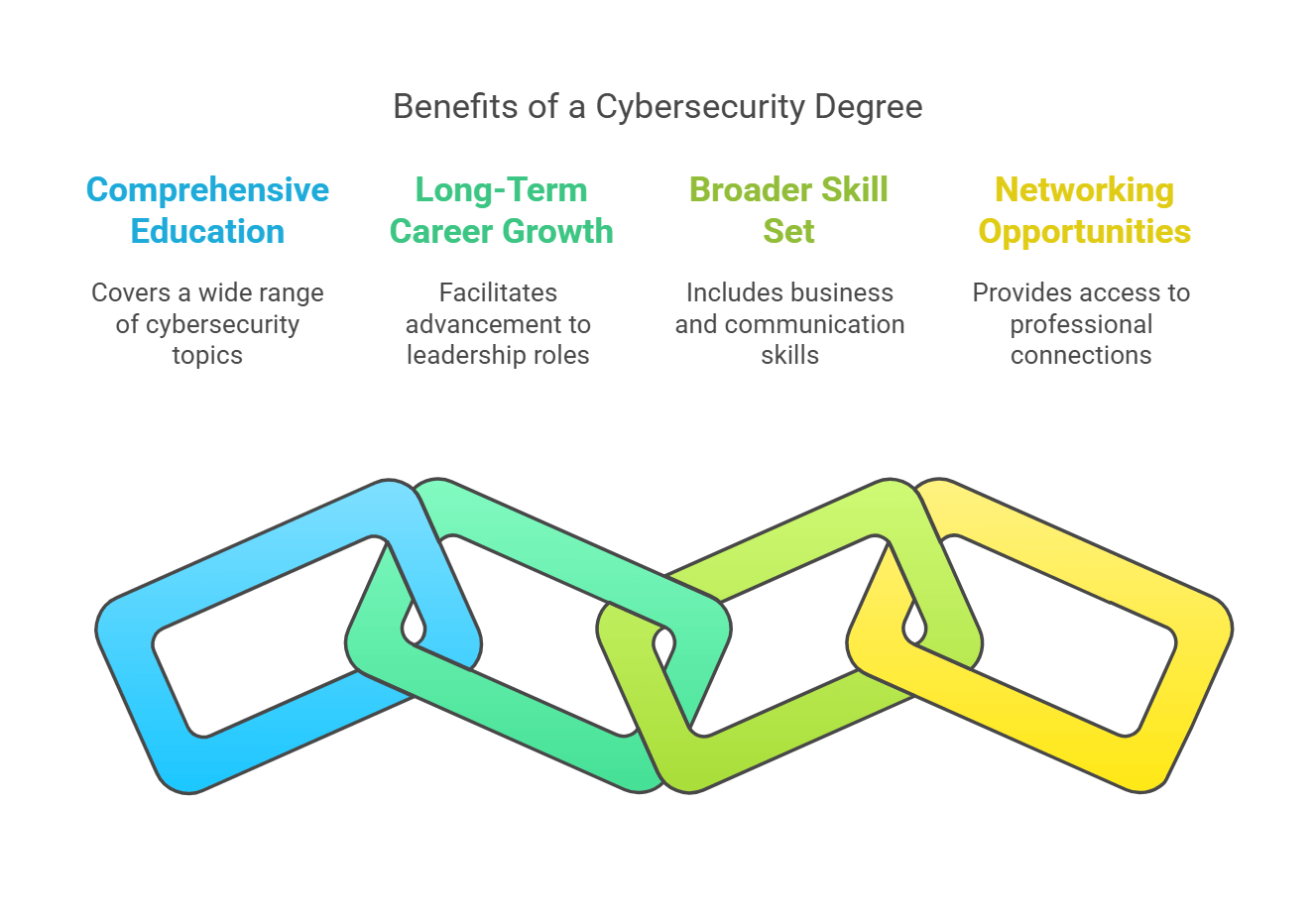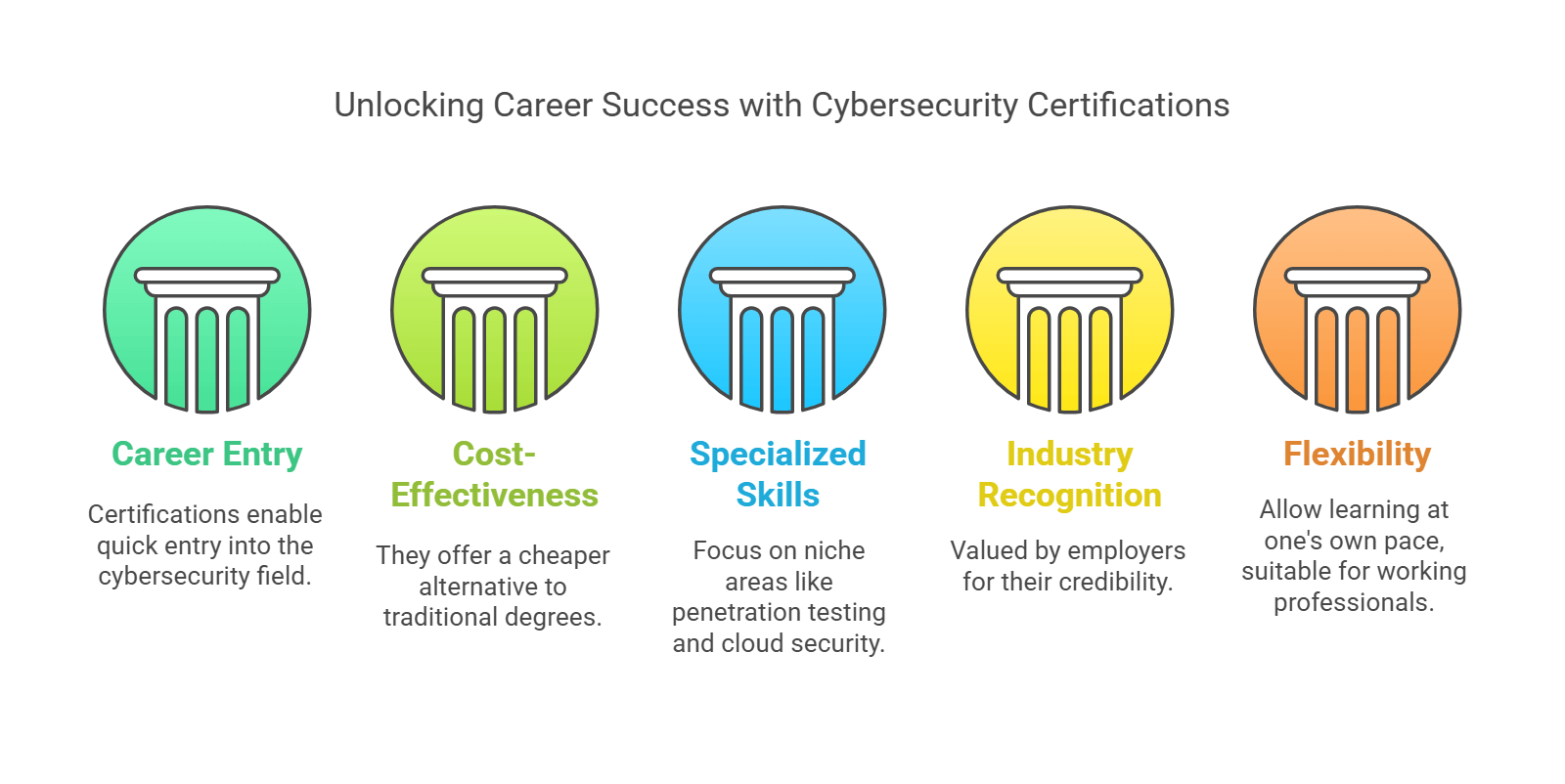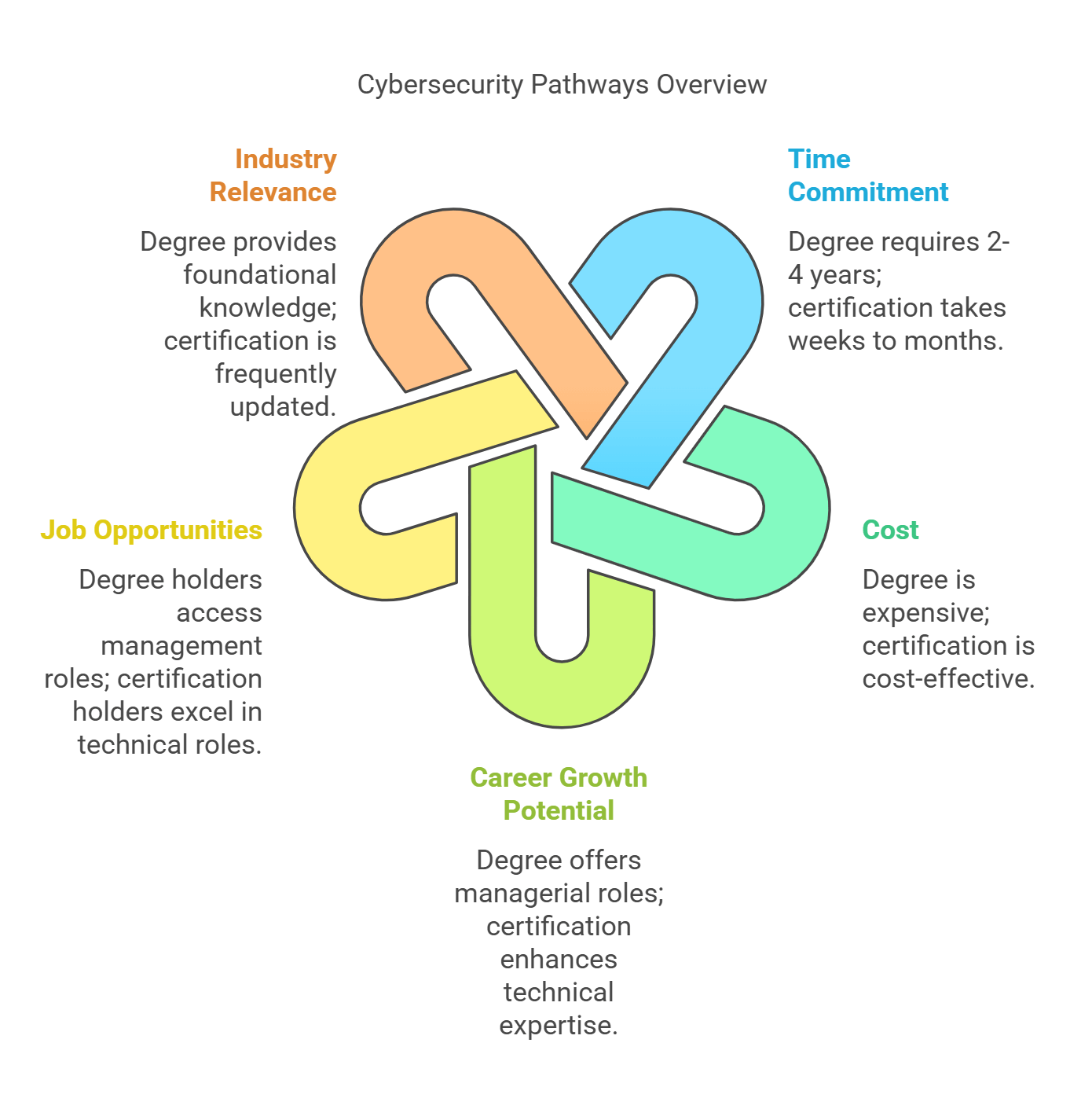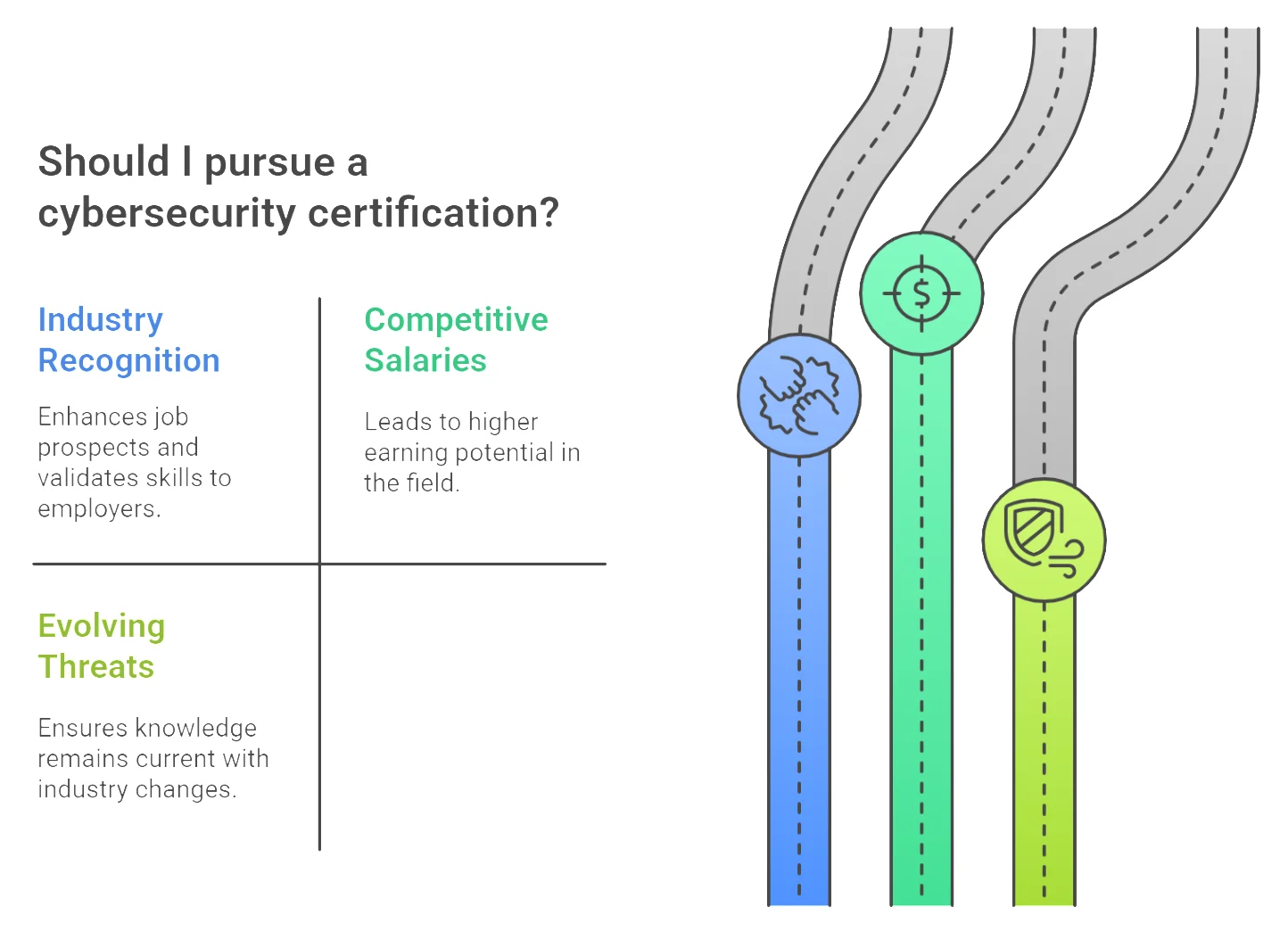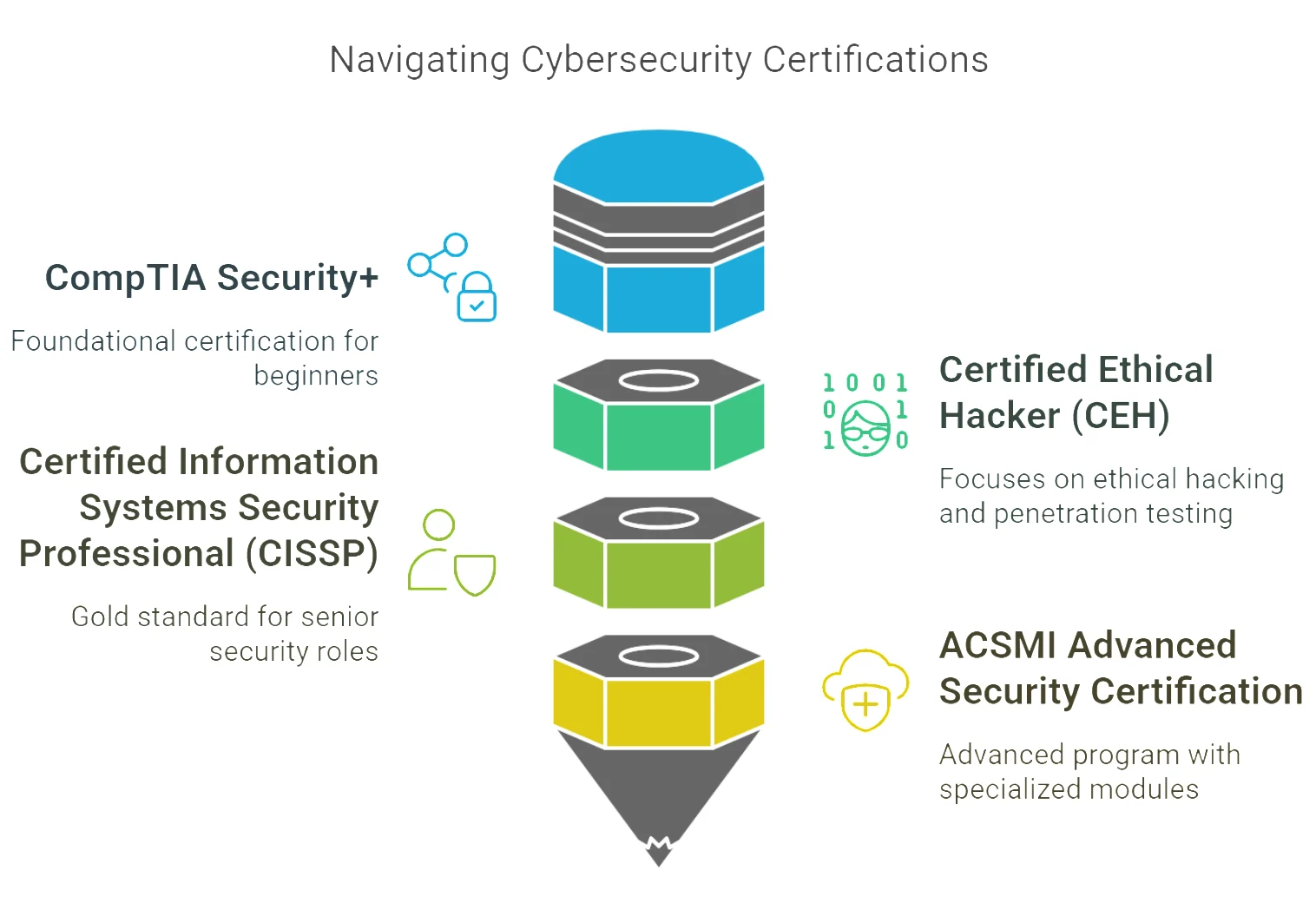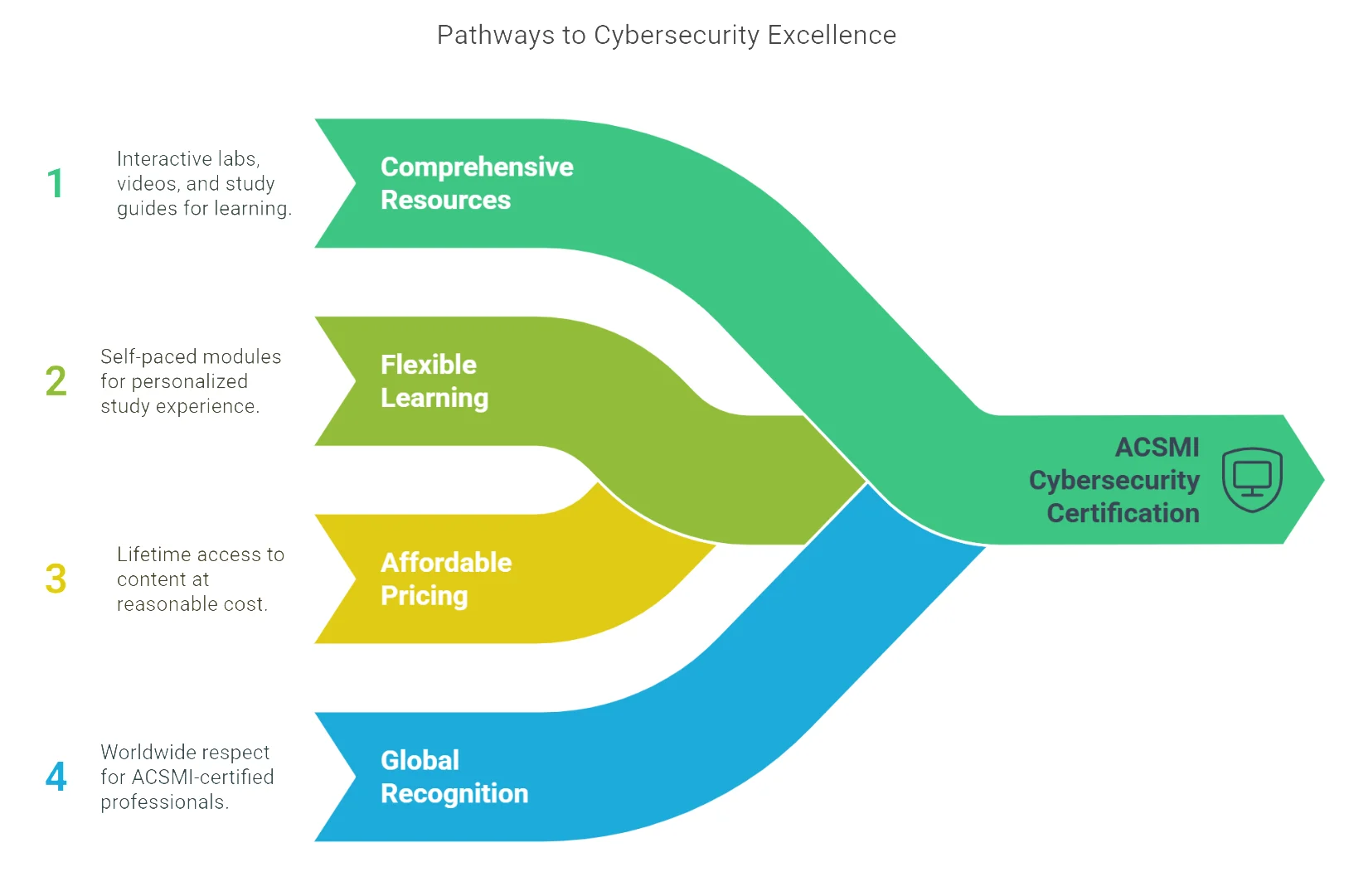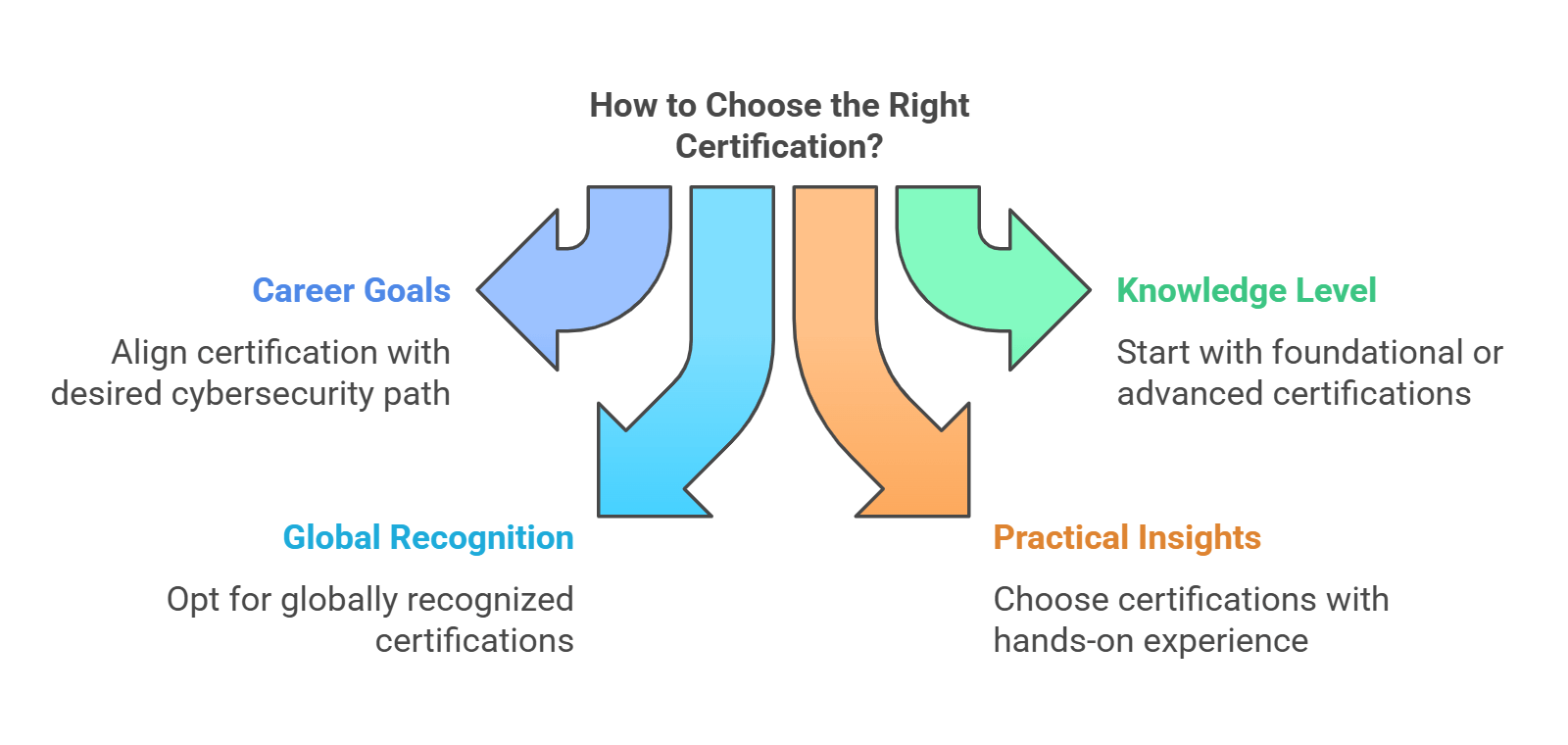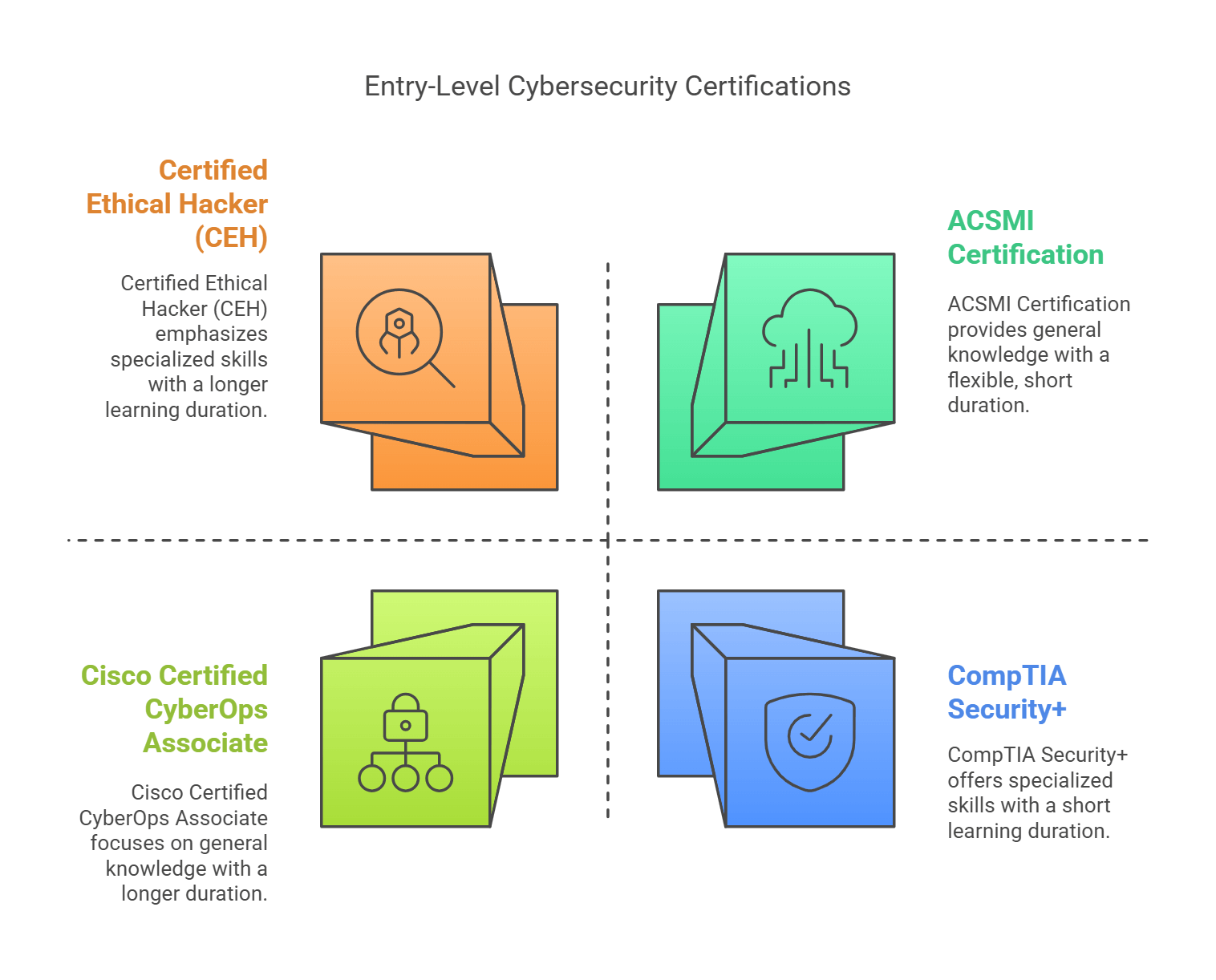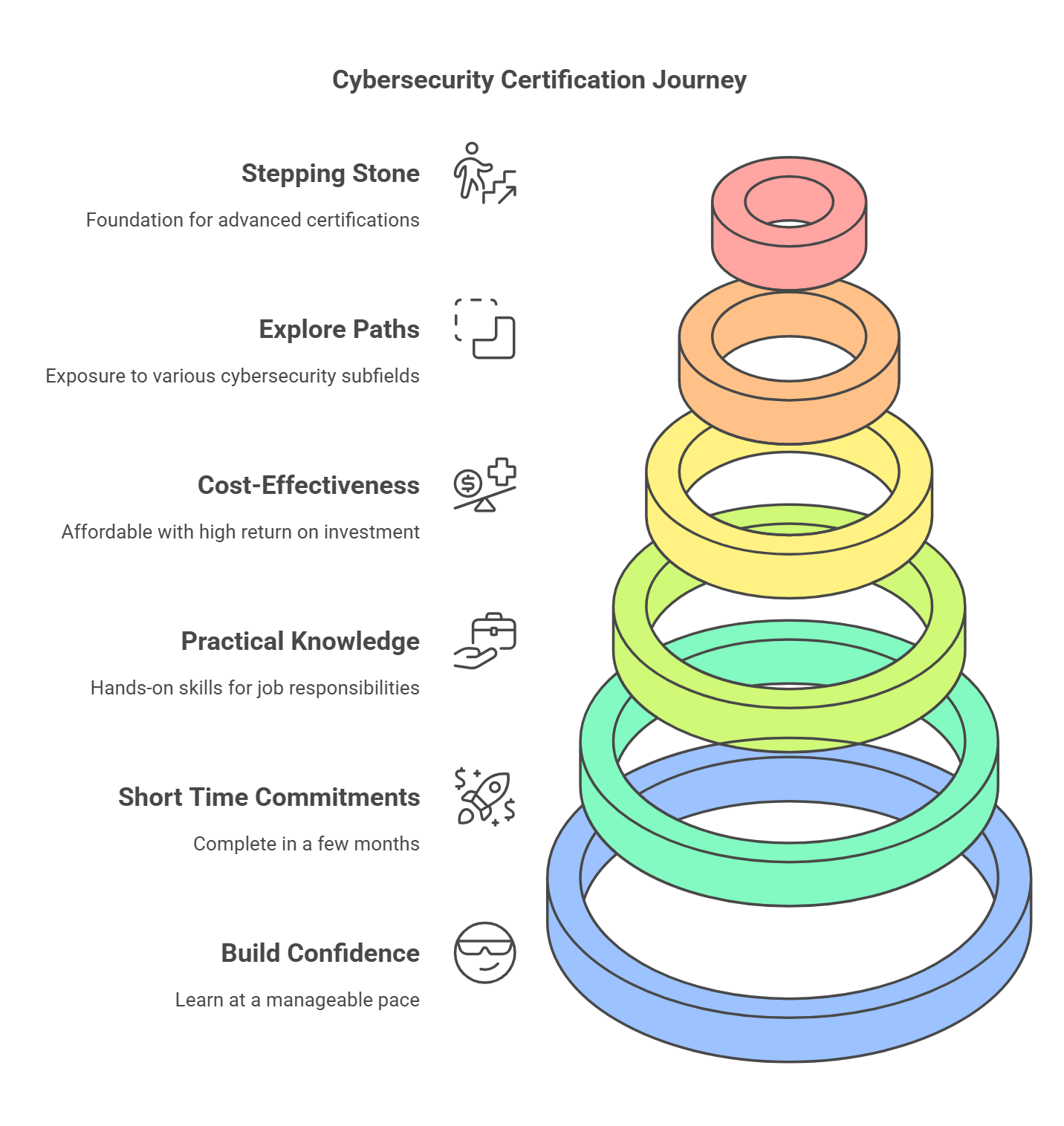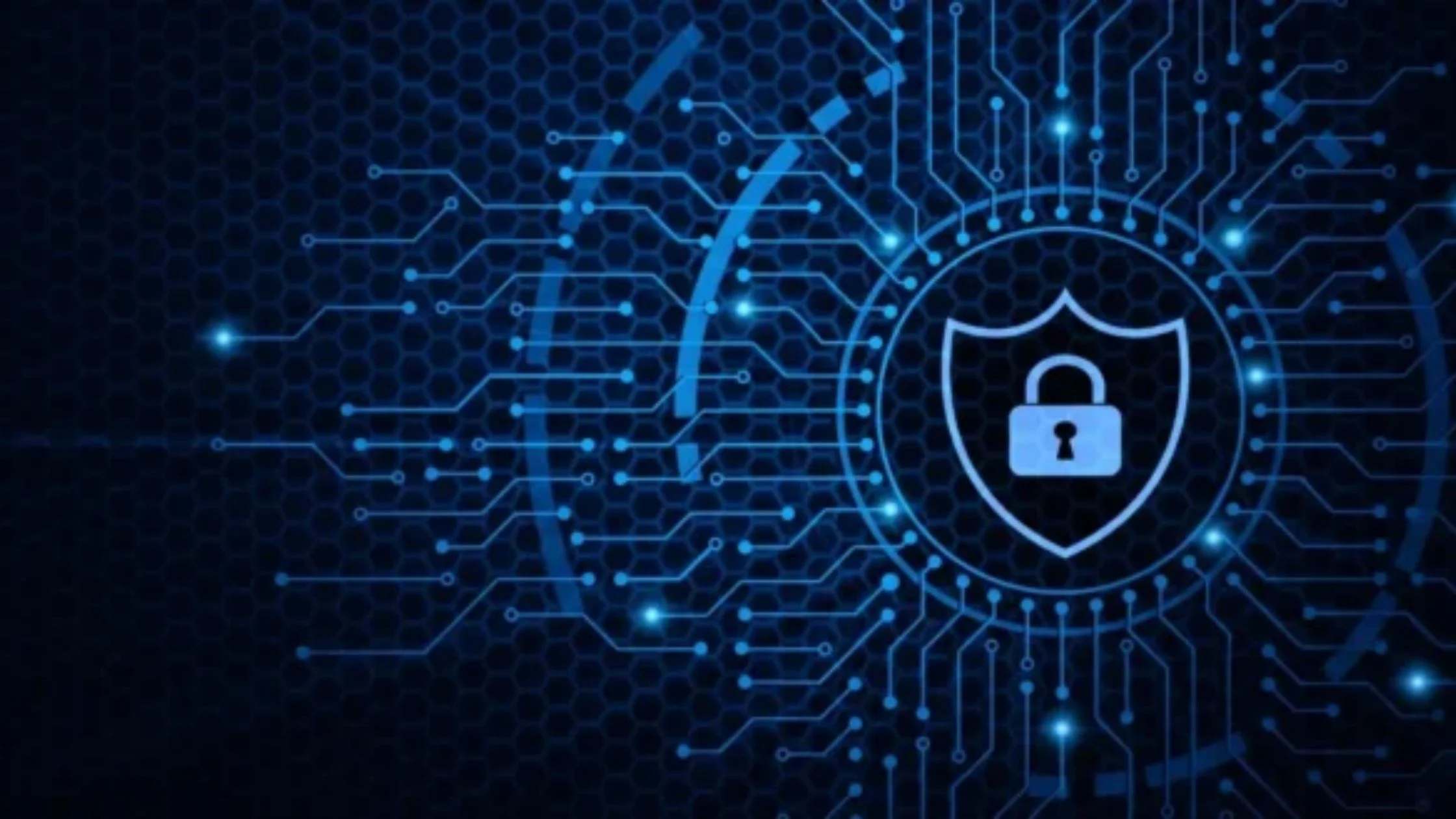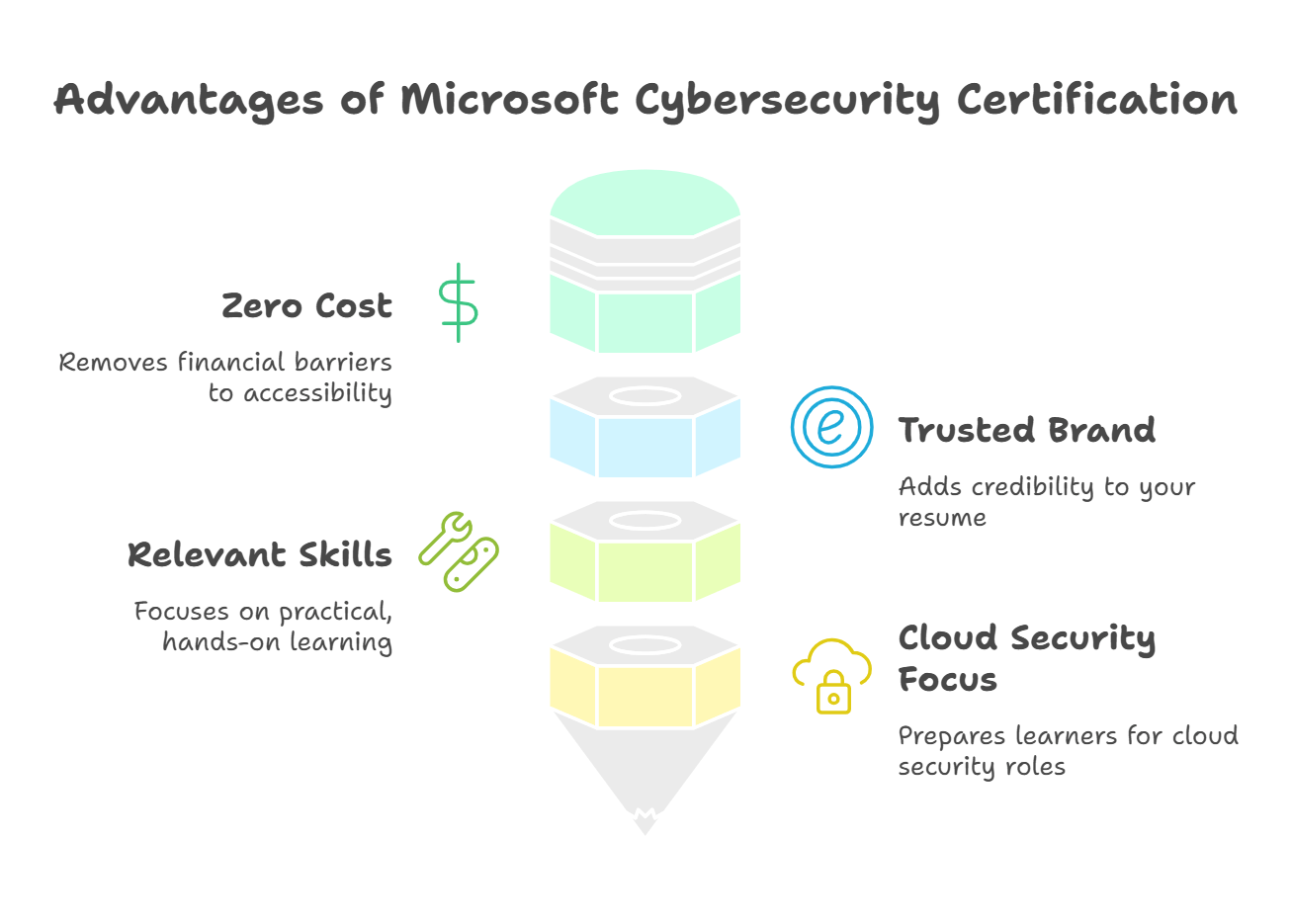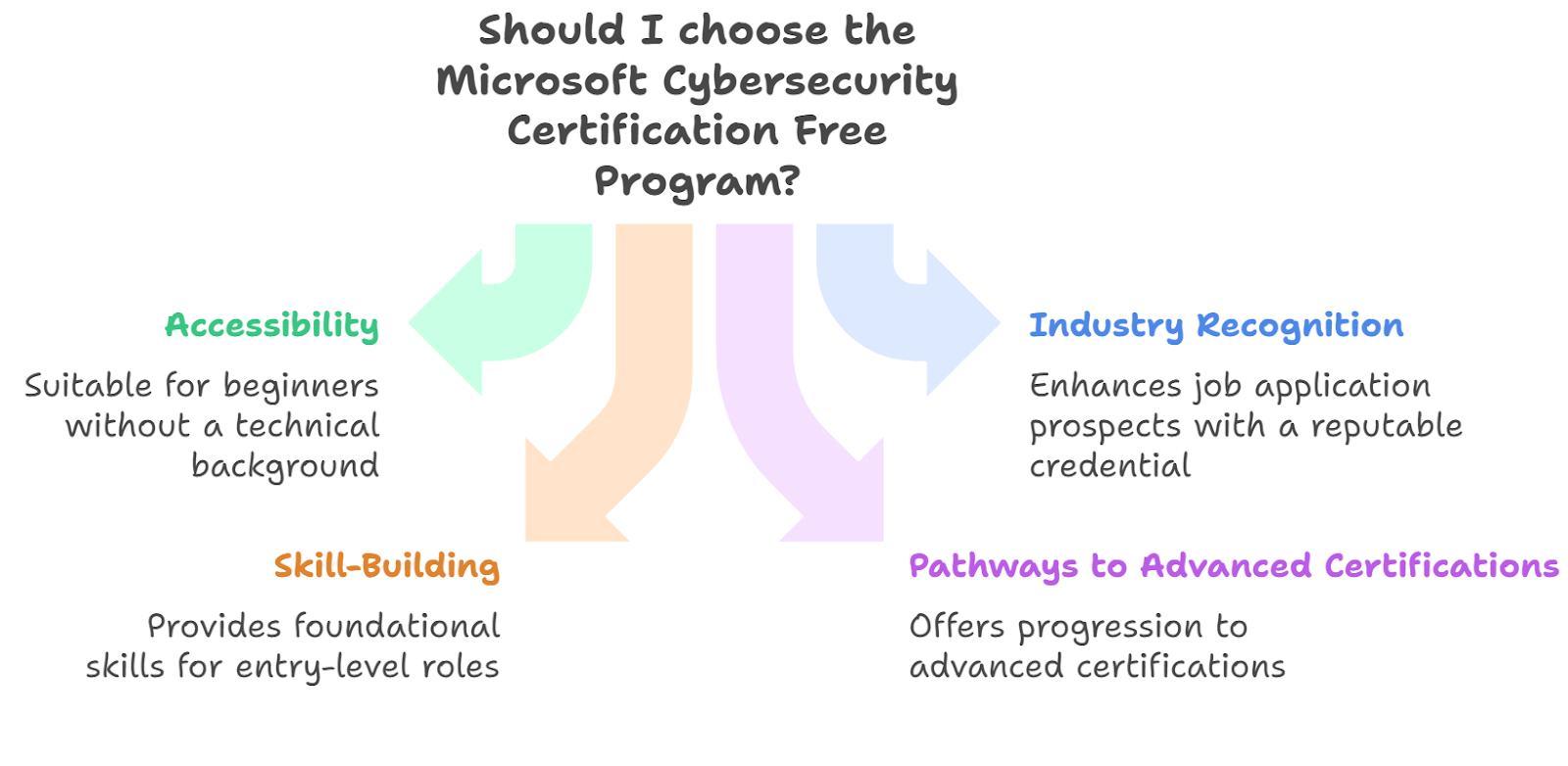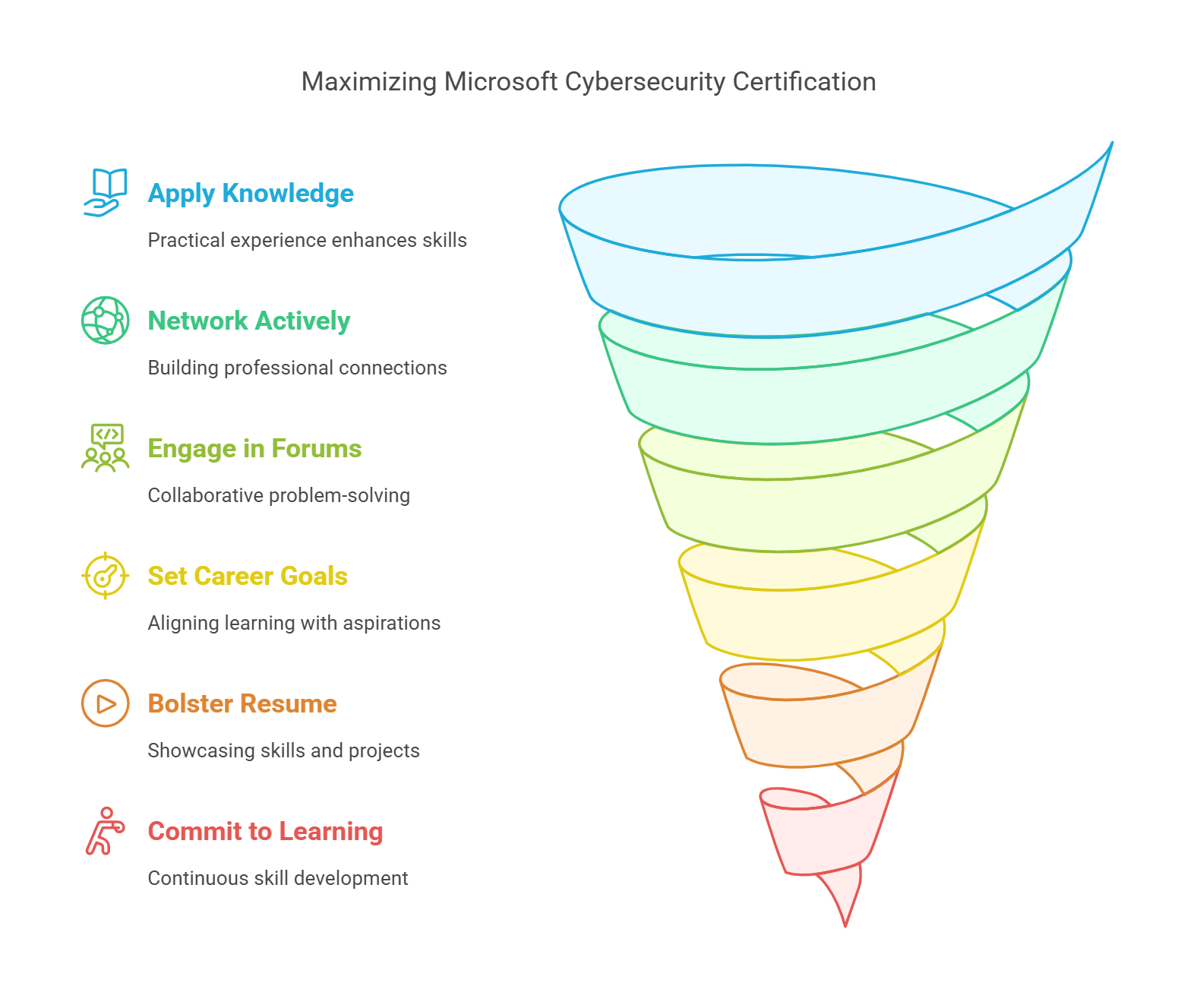Table of Contents
Google’s Cybersecurity Certification: A Complete Breakdown for 2025
With the rise in cyber threats, organizations and individuals need robust security expertise more than ever. Google’s Cybersecurity Certification has emerged as a credible pathway for those looking to enter the field. This blog provides an updated, detailed breakdown of Google’s Cybersecurity Certification in 2025, its modules, career benefits, and a comparison with ACSMI’s Cybersecurity Certification, including Cybersecurity Certification Price considerations to help you make an informed decision.
What is Google’s Cybersecurity Certification?
Google launched its Cybersecurity Certification to equip learners with fundamental and advanced skills to tackle modern cyber threats. The program is available on Coursera and consists of six core modules designed to provide hands-on training. It is an excellent starting point for anyone interested in cybersecurity, as it covers essential principles, practical exercises, and real-world applications. This certification is particularly useful for beginners and IT professionals transitioning into cybersecurity roles.
Why Choose Google’s Cybersecurity Certification in 2025?
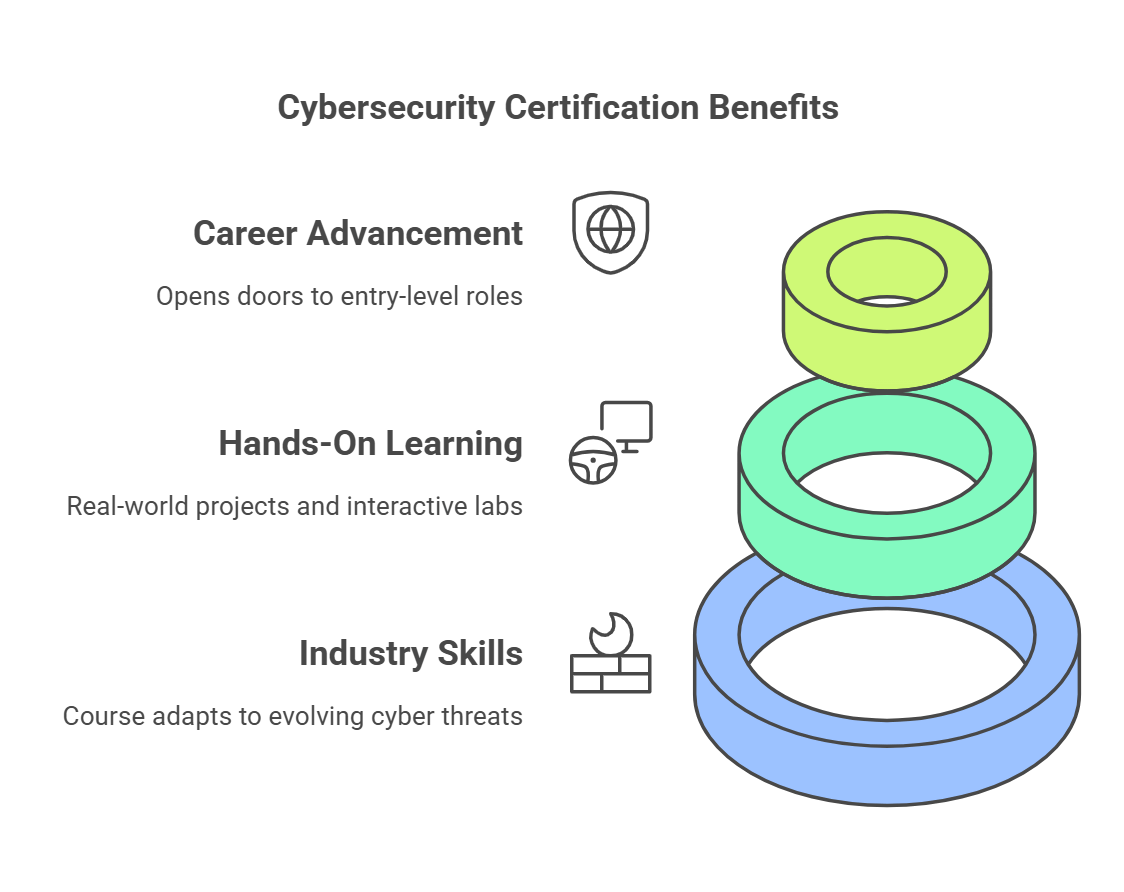
Industry-Relevant Skills
The course is continuously updated to address evolving cyber threats. As cybercriminals develop new attack strategies, the course material adapts to ensure learners are prepared for modern challenges. The content aligns with industry standards, helping learners build a solid foundation in cybersecurity best practices. Staying updated with the latest skills gives professionals a competitive edge in the job market.
Hands-On Learning
This certification is not just about theoretical knowledge; it offers real-world projects and interactive labs to enhance practical understanding. Students engage in simulated cybersecurity incidents, learning how to respond effectively. The inclusion of hands-on exercises ensures that learners can apply their knowledge in real-life scenarios, making them job-ready upon completion.
Career Advancement
For those looking to start or grow their careers in cybersecurity, this certification provides a strong foundation. It opens doors to entry-level cybersecurity roles, making it easier for individuals to secure their first job in the field. Additionally, professionals who already work in IT can use this certification to transition into cybersecurity-focused positions with better job prospects and salary packages.
Complete Breakdown of the Six Modules
Each module of Google’s Cybersecurity Certification provides structured learning and covers different aspects of cybersecurity.
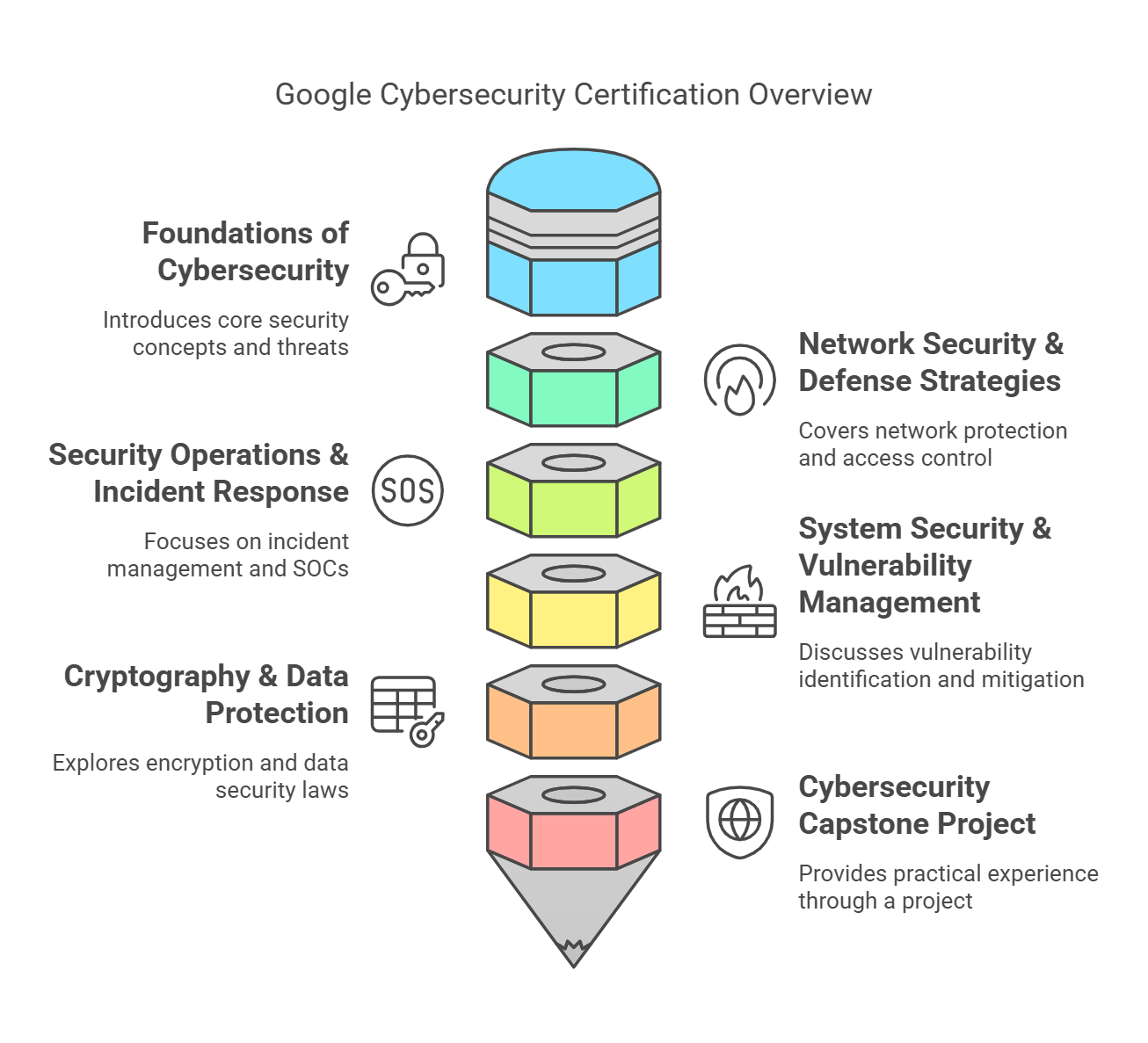
1. Foundations of Cybersecurity
This module introduces the fundamental principles of cybersecurity. Learners gain an understanding of core security concepts, including the CIA triad (Confidentiality, Integrity, Availability). It also covers common cyber threats like phishing, malware, and ransomware, explaining how these attacks work and how to defend against them. Additionally, risk management techniques and security controls are discussed to help learners build a security-first mindset.
2. Network Security & Defense Strategies
In this module, learners explore the basics of network security, including how firewalls, VPNs, and intrusion detection systems work. Network segmentation and access control methods are introduced to prevent unauthorized access to sensitive data. Practical exercises help learners understand how organizations protect their corporate networks. By the end of this module, students can identify network vulnerabilities and apply security measures to mitigate risks.
3. Security Operations & Incident Response
This module explains how Security Operations Centers (SOCs) function and the role they play in protecting organizations from cyber threats. Learners get hands-on experience in identifying, responding to, and mitigating cyber incidents. The use of SIEM (Security Information and Event Management) tools is covered, helping students understand how security alerts are monitored and managed. Additionally, real-world case studies provide insights into handling cyberattacks efficiently.
4. System Security & Vulnerability Management
This module focuses on identifying and mitigating system vulnerabilities. It covers the importance of patch management and how organizations keep their systems secure by regularly updating software. Learners are introduced to ethical hacking and penetration testing techniques, which help security professionals identify weaknesses before attackers exploit them. Endpoint security solutions such as antivirus software and endpoint detection and response (EDR) tools are also explored in depth.
5. Cryptography & Data Protection
Cryptography is essential for securing sensitive information, and this module provides an in-depth look at encryption techniques. Learners explore modern encryption methods like AES and RSA, which are used to protect data from unauthorized access. Public Key Infrastructure (PKI) and SSL/TLS protocols are explained to help students understand how secure communications work online. The module also discusses data security laws and compliance requirements, ensuring learners are aware of legal obligations in cybersecurity.
6. Cybersecurity Capstone Project
The final module involves a hands-on capstone project where learners apply the skills they have gained throughout the course. They work on a simulated cybersecurity incident, developing an effective response strategy. This project also helps prepare learners for job interviews by providing them with practical experience they can showcase to potential employers. By the end of this module, students are ready to enter the cybersecurity job market with confidence.
Is Google’s Cybersecurity Certification Worth It in 2025?
With businesses investing heavily in cybersecurity, certifications like Google’s provide a structured learning path. It is particularly valuable for:
-
Beginners looking to enter the cybersecurity industry with no prior experience.
-
IT professionals transitioning to cybersecurity roles who need structured learning.
-
Organizations that want to train employees in security best practices to prevent cyber threats.
Google Cybersecurity Certification Jobs & Career Opportunities
One of the most common queries is, “What jobs can I get with a Google Cybersecurity Certificate?” The certification can open doors to roles such as:
-
Cybersecurity Analyst – Monitoring and responding to security incidents to protect organizational data.
-
Network Security Engineer – Implementing and managing security measures to protect networks from threats.
-
SOC Analyst – Managing security alerts, investigating cyber threats, and ensuring incident response is handled efficiently.
How to Pass Google’s Cybersecurity Certification Exam?
Many people wonder, “Is Google’s Cybersecurity Certification difficult?” The good news is that it is designed for beginners, making it accessible to those without prior experience, including those seeking Certification Without Experience. However, passing the exam requires effort and dedication. Here are some key strategies to help you succeed:
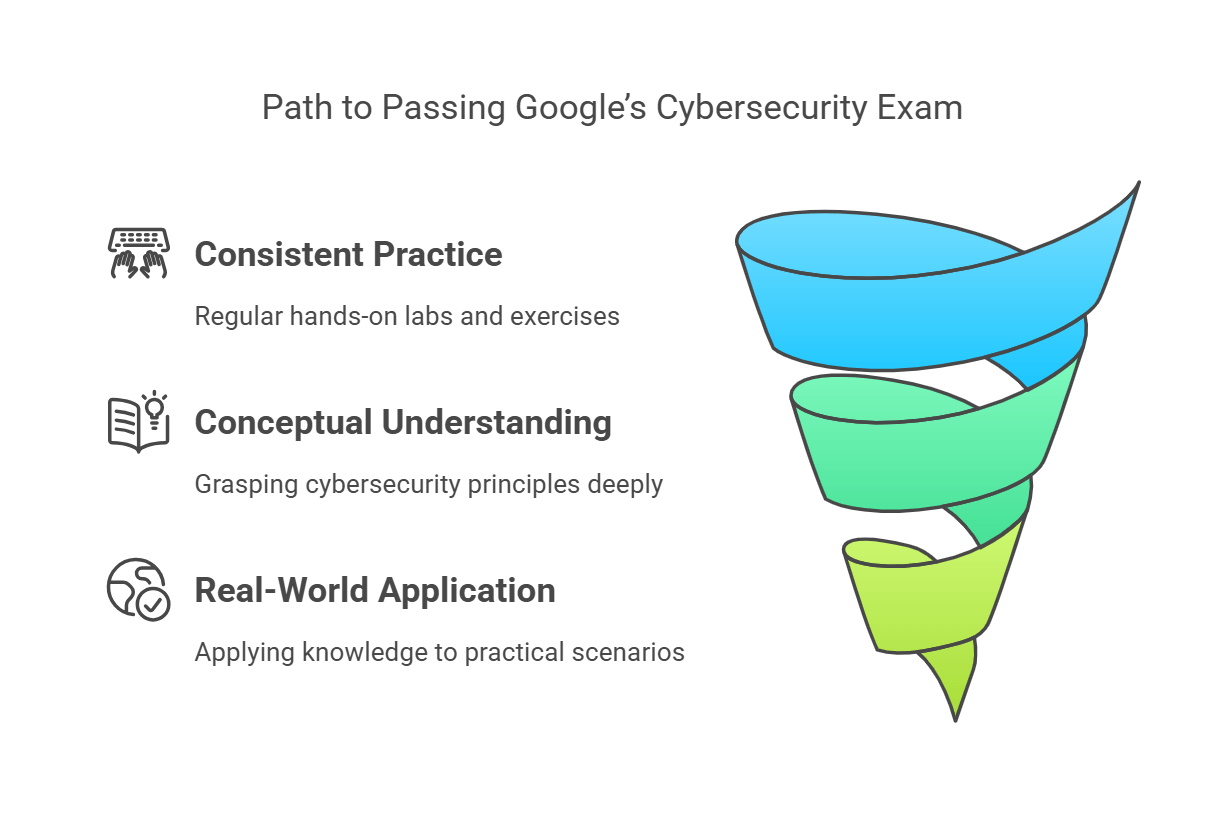
Consistent Practice:
One of the most important things you can do to pass the exam is to practice regularly. The certification includes hands-on labs and exercises that give you real-world experience. By engaging in these activities frequently, you will become more familiar with cybersecurity tools and techniques. Practicing consistently will also help reinforce your knowledge, making it easier to recall important concepts during the exam.
Understanding Concepts:
To pass the exam, you need to develop a strong foundation in cybersecurity principles. Simply memorizing information will not be enough. Instead, focus on understanding how different security measures work and why they are important. Study key topics such as network security, cryptography, and incident response. If you come across difficult concepts, take the time to break them down into simpler terms. Watching tutorial videos or reading explanations from different sources can also help strengthen your understanding.
Real-World Application:
Cybersecurity is not just about theory; it requires practical skills. To be fully prepared, apply what you learn to real-world scenarios. Try setting up security systems, identifying vulnerabilities, or responding to simulated cyber threats. Many of the exercises in the certification course are designed to mirror real-life situations. Completing these tasks will help you gain confidence in your abilities and improve your problem-solving skills.
By following these strategies, you will increase your chances of passing the Google Cybersecurity Certification exam and gaining valuable skills for your cybersecurity career.
Final Thoughts: Should You Get Google’s Cybersecurity Certification in 2025?
Cybersecurity is becoming more important as businesses and individuals face increasing online threats. If you are looking to start a career in this field, Google’s Cybersecurity Certification is a great choice. It provides hands-on training, teaches industry-relevant skills, and is recognized by major companies. This certification, along with ACSMI Certification, is especially useful for beginners who want to build a strong foundation in cybersecurity. It also helps IT professionals transition into security roles. Since cybersecurity jobs are in high demand, having this certification can give you an advantage in the job market. If you want to start a rewarding career in cybersecurity, this certification is a solid first step.
Frequently Asked Questions (FAQs)
1. How long does it take to complete Google’s Cybersecurity Certification?
The time required to complete the certification depends on your learning pace. On average, it takes between 3 to 6 months. If you have previous IT experience or can dedicate more time each week, you may finish sooner. However, if you are new to cybersecurity or have a busy schedule, it might take longer. The course is self-paced, so you can complete it at a speed that works best for you.
2. Is Google’s Cybersecurity Certification free?
No, the certification is not free, but it is affordable compared to other cybersecurity courses. The program is available on Coursera, which offers a monthly subscription model. If you cannot afford the fee, you can apply for financial aid, which may allow you to access the course at a reduced cost or for free.
3. Can I get a cybersecurity job with Google’s certification?
Yes, this certification can help you get an entry-level cybersecurity job. It covers essential skills needed for roles such as Security Analyst, SOC Analyst, and Network Security Engineer. Many companies recognize Google’s certification, making it a useful credential to have when applying for cybersecurity positions.
4. What is the salary of a cybersecurity analyst in 2025?
The salary for a cybersecurity analyst can vary depending on factors such as location, experience, and company size. On average, entry-level cybersecurity professionals earn between $70,000 and $90,000 per year. As you gain more experience and earn additional certifications, your salary can increase significantly.
5. How does Google’s Cybersecurity Certification compare to CompTIA Security+?
Google’s certification is designed for beginners and focuses on hands-on training, making it easier for newcomers to understand cybersecurity concepts. CompTIA Security+, on the other hand, is more advanced and widely recognized in the industry. If you are new to cybersecurity, Google’s certification is a great starting point. Later, you can pursue CompTIA Security+ to deepen your knowledge and improve job prospects.
6. Does Google’s certification require prior experience?
No, the certification is designed for beginners, so you do not need any prior cybersecurity experience. The course starts with basic concepts and gradually progresses to more advanced topics. This makes it suitable for anyone interested in starting a cybersecurity career, even if they have no technical background.
7. Can I take the course at my own pace?
Yes, Google’s Cybersecurity Certification is a self-paced online program. This means you can study whenever it is convenient for you. If you have a full-time job or other commitments, you can learn at a slower pace. If you want to complete the course quickly, you can dedicate more hours each week to studying.
8. Does the certification expire?
No, Google’s Cybersecurity Certification does not have an expiration date. Once you earn the certificate, it remains valid for a lifetime. Unlike some other cybersecurity certifications that require renewal, Google’s certification allows you to keep it as a permanent credential on your resume.

